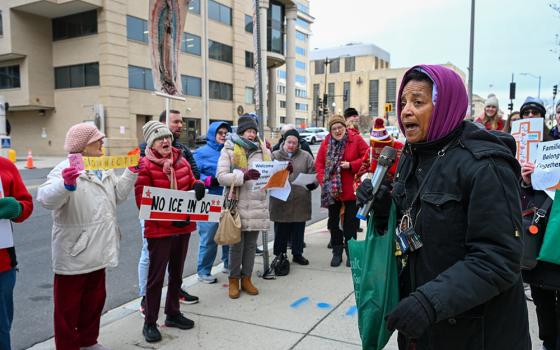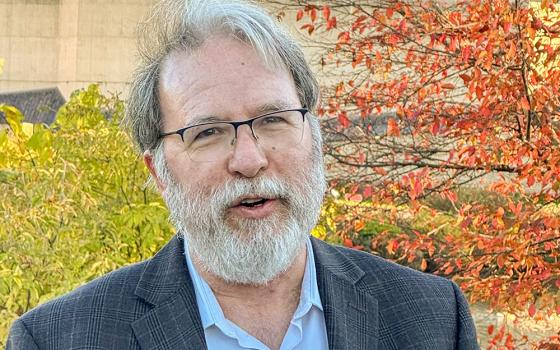Sr. Simone Campbell, a Sister of Social Service, speaks at the National Press Club in Washington Feb. 25, 2020. (CNS/Tyler Orsburn)
This week on "The Nonviolent Jesus Podcast," John Dear hosts the second part of a conversation with Sr. Simone Campbell. (Read about the first part here.)
This episode begins with Campbell's reflections on her daily contemplative, Zen practice as the foundation of her lifelong work for justice.
"My practice begins every morning," Campbell said. "I have a half hour of Zen sitting, being quiet and opening myself. I call it 'deep listening to the divine.' There, things can bubble up. I follow this with a half hour of spiritual reading. I have to feel secure in myself to be willing to open myself to other peoples' points of view. If I'm riled up, I can't do this work, so I need my practice. If we're going to create change, it's required that we understand what's going on inside us if we want to understand others."
"My religious community is dedicated to the Holy Spirit, and our feast is Pentecost," she continued. "Pentecost is about the flourishing of the Holy Spirit in places that are challenging, or potentially conflicted. I need to be able to listen well enough so that what I might say will touch the other. I love being on fire. It's so exciting."
In her book Hunger for Hope, Campbell writes about the importance of "prophetic imagination." For Campbell, community is the best way to nurture prophetic imagination.
Advertisement
She also spoke about Walter Brueggemann's five characteristics outlined in his book, The Prophetic Imagination: long and available memory; touching the reality of the pain; living in hope; effective discourse across generations and cultures; and the capacity to sustain long term tension with the dominant culture, and the potential for insight and imagination.
"You can't have hope without community," Campbell said. "Community is at the heart of hope. The hardships people are laboring through today are essentially because of the lack of community, because of our radical individualism and isolation. Community happens when we are in relationship with others so much that we rub each other a little bit the wrong way, and learn the capacity to see the world in different ways."
"Hope," she concluded, "is critically connected to touching the pain of the world as real. It demands a response."






